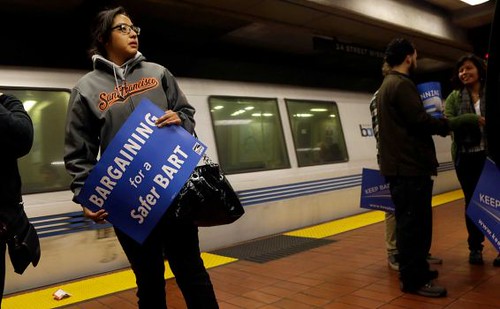
Bay Area Rapid Transit (BART) workers went on strike and paralyzed the system in this region of California. The strike comes at a time of great economic distress., a photo by Pan-African News Wire File Photos on Flickr.
San Francisco rail workers plan to strike on Friday barring last-minute deal
8:47pm EDT
By Laila Kearney
SAN FRANCISCO (Reuters) - Commuter rail workers in the traffic-clogged San Francisco Bay Area will go on strike on Friday unless a last-minute deal with management on a new contract is reached before midnight on Thursday, an employee union said.
The plan for a strike on Friday follows a series of marathon bargaining sessions between the Bay Area Rapid Transit (BART) management and employee unions that have dragged well into the night every day this week, but have so far not produced a deal.
The sides have been at loggerheads for months over pay and benefits for more than 2,000 train drivers and other union workers who are demanding large pay raises in part to offset being asked to contribute to their pensions and other benefits.
By Thursday, the sides had finally reached an "overall understanding" on economic issues, but remained at odds over workplace rules, according to Roxanne Sanchez, who represents one of two main unions in talks with management.
"At midnight tonight, unless there were something to change, workers will be forced out on strike," Sanchez, president of the Service Employees International Union Local 1021, said in a statement. The second union involved in the talks is the Amalgamated Transit Union.
Talks that had begun at 10 a.m. local time (1700 GMT) on Wednesday ended about 30 hours later on Thursday afternoon with the two sides splitting up, said BART spokeswoman Alicia Trost.
The BART trains are used for more than 400,000 rides each day in the Northern California region, where traffic is among the worst in the United States. A four-and-a-half-day BART strike in July forced some residents to miss work and others to endure commutes of three hours or more.
Under the terms of the last offer made public, BART management said it offered a 12 percent pay raise over four years to workers who they say earn on average $79,000 a year, plus benefits. The unions put the average worker's salary at
$64,000.
WORKPLACE RULES
Union leaders have justified their demands for higher pay in part by pointing out that San Francisco and nearby Oakland are among the 10 most expensive U.S. cities to live.
Harley Shaiken, a labor expert at University of California at Berkeley, said the union also hoped to make up for years of stagnant wages during the economic downturn.
Meanwhile, BART officials were seeking to conserve resources to update outdated parts of the transit system, he said.
But it appeared to be workplace rules and not issues of pay that were holding up a deal on Thursday, with Sanchez complaining that BART management, after reaching a general agreement on economics, now wanted to "fundamentally and significantly change the conditions under which we work."
BART General Manager Grace Crunican told reporters management did not want a strike, but said: "These are work rules that are essential to maintaining the future efficiency and effectiveness of the agency." Neither side elaborated on the content of the rules.
A federal mediator who has been involved in the talks, and who had previously reported that the sides were making progress, said on
Thursday afternoon that they had been "unable to bridge the gap" in talks, and that federal mediation efforts would end.
"Our efforts to help them to do that at this point in time were not successful so we made a mediator's determination that there was nothing further for us to do," said George Cohen, director of the U.S. Federal Mediation and Conciliation Service. "As a result, our mediation process has come to an end."
He added that mediation could resume at the request of BART management and the unions.
(Additional reporting by Sharon Bernstein in Sacramento; Writing by Alex Dobuzinskis; Editing by Cynthia Johnston and Lisa Shumaker)
No comments:
Post a Comment